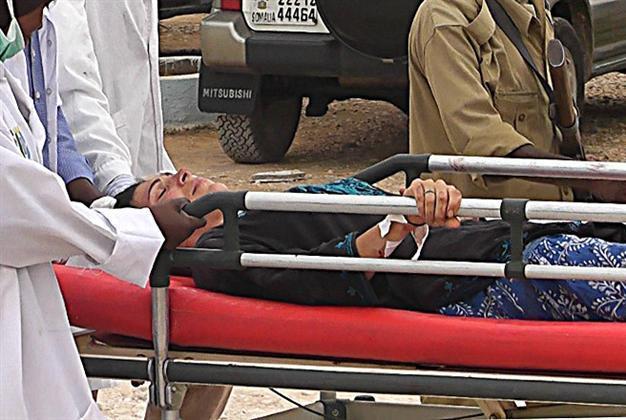Somali Shebab bomb on UN bus kills at least six
MOGADISHU - Agence France-Presse

A survivor is carried away on a gurney from the scene of a bomb attack on a UN van that killed at least six UN workers on April 20, 2015 in the northeastern town of Garowe. AFP Photo
Somalia's Shebab Islamists killed at least six UN workers on April 20 when they exploded a huge bomb in a staff bus in the northeastern town of Garowe, police said.
The head of the United Nations in Somalia, Nick Kay, condemned the attack and said he was "shocked and appalled by (the) loss of life".
Somalia's Al-Qaeda-affiliated Shebab insurgents claimed responsibility for the attack, branding the United Nations a "colonisation force in Somalia".
"Four of the dead are foreigners and two are Somalis," local police chief Ahmed Abdulahi Samatar said, adding that "seven others were also wounded, two of them foreigners".
Images from the scene show a minibus marked with the UN logo ripped apart by a ferocious blast.
No details of nationalities of the foreigners killed and wounded were given.
Somali police official Abdullahi Mohamed told AFP that the bomb was "believed to have been attached to the minibus and was detonated near the UN office."
Witnesses and security officials suggested the explosion could also have come from a roadside bomb that was detonated as the minibus, which is used to transport staff from a guesthouse to the UN compound, was passing.
Garowe, in the northeastern region of Somalia, is capital of the semi-autonomous Puntland region.
A UN representative in Somalia was unable immediately to confirm the death toll.
Shebab spokesman Abdulaziz Abu Musab confirmed the Islamist group had carried out the attack.
"We targeted the UN in Garowe, we killed some and wounded others. They are part of the colonisation force in Somalia," he told AFP.
The Shebab, meaning "youth", emerged out of a bitter insurgency against Ethiopia, whose troops entered Somalia in a 2006 US-backed invasion to topple the Islamic Courts Union that was then controlling the capital Mogadishu.
Shebab rebels continue to stage frequent attacks in their fight to overthrow Somalia's internationally-backed government, as well as to counter claims that they are close to defeat due to the loss of territory, regular US drone strikes against their leaders and defections.
They have also carried out revenge attacks across the wider region against countries which contribute troops to the 22,000-strong African Union force in Somalia, AMISOM.
Earlier this month Shebab gunmen attacked Garissa university in northeastern Kenya, killing nearly 150 people, mostly students.
Attacks against the United Nations are also common. In December four people were killed when a suicide bomber rammed a car packed with explosives into a UN convoy in the capital Mogadishu.
In June 2013, Shebab gunmen stormed a UN compound in the capital Mogadishu, killing 16.
UN aid chief for Somalia Philippe Lazzarini said he was "horrified" by the attack on April 20, which he said showed a "total and abject disregard for life."
In other recent attacks Shebab gunmen shot dead a Puntland lawmaker, Adan Haji Hussein, on April 18 and on April 19 killed three African Union troops in an ambush in the south of the war-ravaged country.
While the Shebab emerged as a Somali Islamist group in 2006 in Mogadishu, they have recruited across the wider region.
